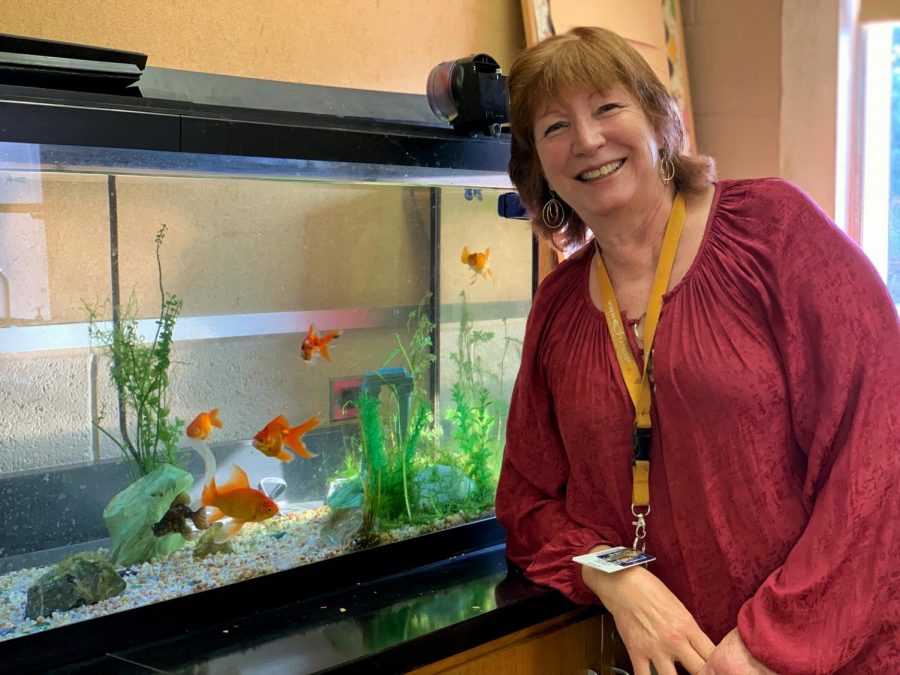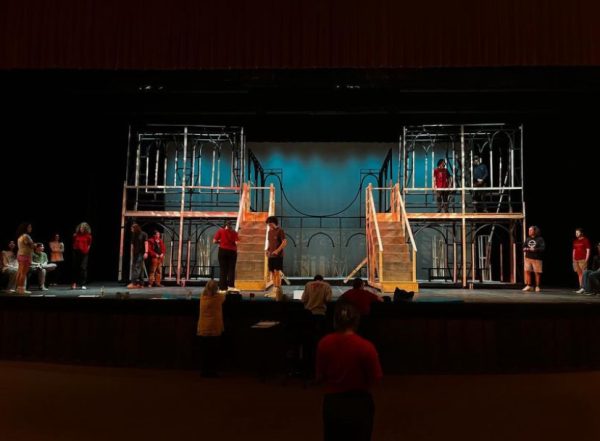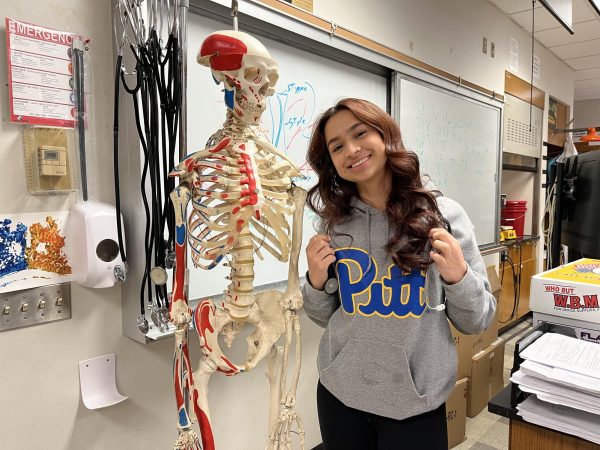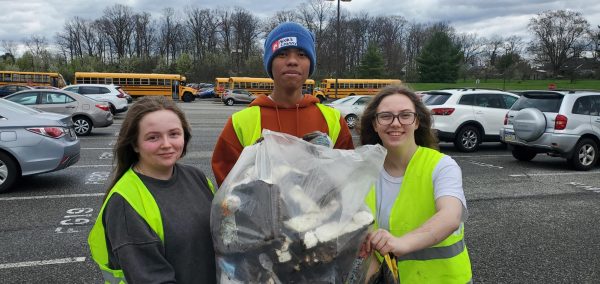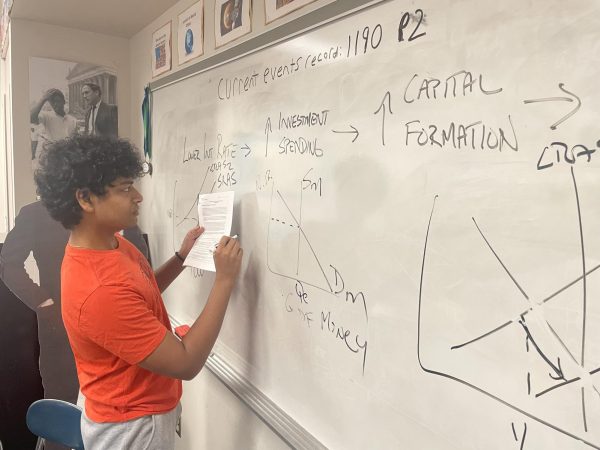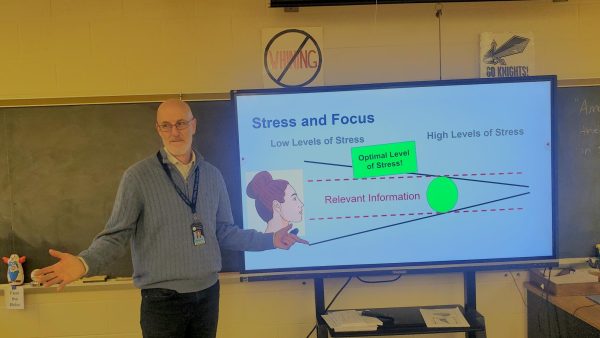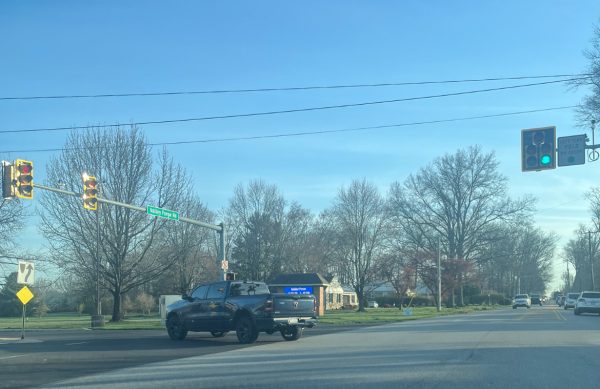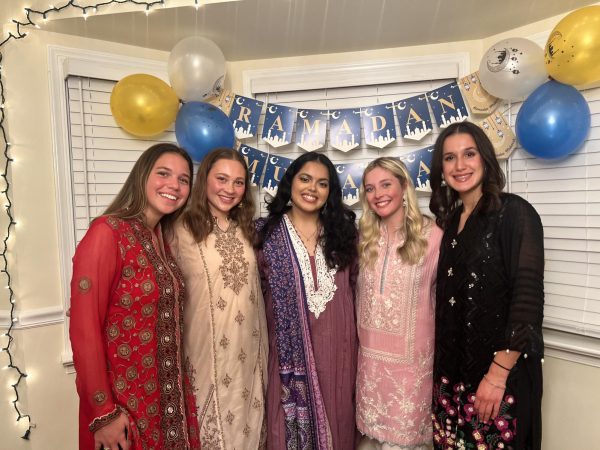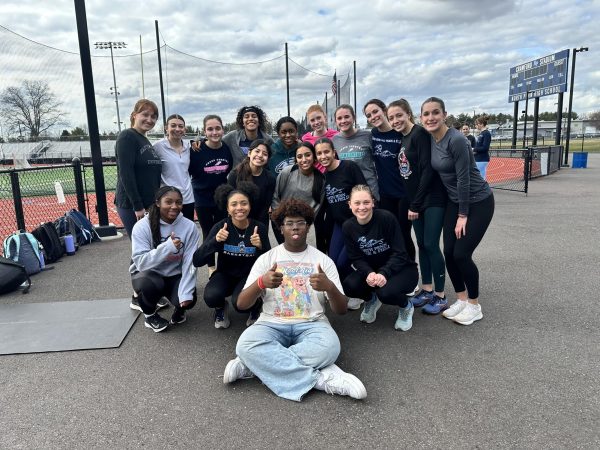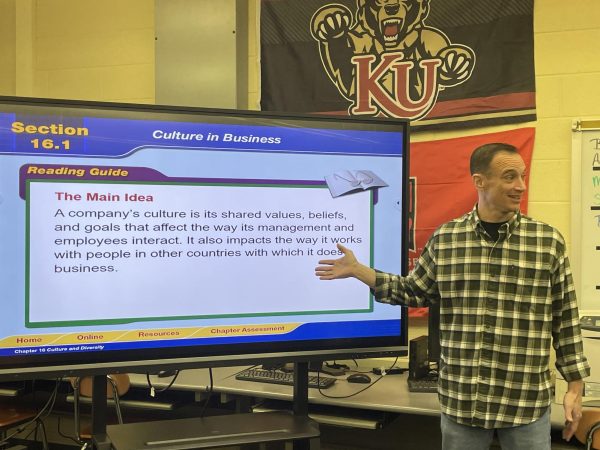Dr. Melody Leithold and the science of saying goodbye
Biology teacher Dr. Leithold will retire after teaching in the North Penn School District for over 30 years.
TOWAMENCIN – Nature has an abundance of beauty that is beyond its physical appearance, and there’s so much more to learn and to discover. Dr. Melody Leithold grew a love for nature at a young age and took it with her as a part of her career. But now, after 34 years of teaching, Leithold is retiring from North Penn this year.
As a child, Leithold grew up in the country surrounded by nature and began learning the names of flowers and watching the stars in the night sky. At that time, she instantly fell in love with all that had to do with the outdoors.
“If I were to describe nature, I would use the words inspirational and intriguing. It reflects the mysteries and majesty of our Creator. One never gets bored with its wonders,” Leithold said.
Leithold has her own farm and occasionally brings her animals to school when she can.
“When my parents divorced, my mother moved to North Wales. I spent most of my time in North Wales and visited my dad in the country. I always had one foot in suburbia and one foot in the country. Then when I was a teenager, my father was able to purchase the property that I have now and that was the farm,” mentioned Leithold.
Her love for the outdoors continues on with her hobbies. Believe it or not, Leithold enjoys windsurfing; in fact, she teaches it to her friends. She also enjoys diving, which is her favorite hobby. In addition, she likes skiing, horseback riding, and training her own horses.
“My horse and I were one of eighteen pairs chosen to lay out the Perkiomen Trail, a trail that goes from Perkiomen Park to Valley Forge. When it was first thought of, people wanted to be able to hike or horseback ride on a trail, and they said ‘well let’s put them in an old rail system that runs in the area that’s not used, it’s abandoned.’ There was a man named Bob Krause, this was in the early 90s, and he spent time with a map and he’d go up and fly around in an airplane and he’d scope out the path he thought that it could take and then he spent a couple summers just having friends of his, and I was one of them, who would ride sections and we would come to the Perkiomen Creek. . . there were a couple of times when Sumac, my horse, and I wound up swimming across [a potential trail area] rather than walking across, but eventually, after the whole thing was laid out, he invited eighteen horse and rider cares that he thought were strong riders.” said Leithold.
Leithold explained that the group of experienced riders “camped up in Valley Forge, and we left on a Saturday morning, we rode all day to Evansburg, camped there that night, the next day on Sunday we road up into Green Lane, camped there, and then the next day on Monday, Memorial Day, we rode all the way up to Silver Spring in Lehigh County, and that’s where it was supposed to end. We videotaped it—we have special videotapes made—and we took it to the county commissioners and said ‘look, this can be done,’ and from there, Mr. Marino, who was the District Attorney and was also an endurance racer, championed the cause, and the county went and bought property along that and put together the Perkiomen Trail.”
Said Leithold, “you can walk, you can bike, you can horseback ride. It is beautiful. . . my kids were young at this time, my daughter was about 6 or 7, so during the parts of the ride that we knew would be easy, she would ride on the back of my horse and I would always remember that we went around to turn in the woods and people were saying ‘watch out on the left, watch out on the right,’ and as we came around to turn, I looked down, this fawn could not have been more than a few hours old, and the mother was standing up on the hill watching us, and we were all so careful not to disturb any of the foliage, not to disturb where it was laying, and my daughter saw that. Now that’s something she’ll remember all her life. The word beautiful, maybe awesome, intriguing? There’s so much out there and you’ll never know when you’re going to run into it,” explained Leithold.
Prior to becoming a teacher, Leithold attended Indiana University of Pennsylvania, where she majored in biology and minored in chemistry. She then went to Penn State University, where she received her Bachelor of Science degree in Secondary Science Education. She was certified in biology and general science in grades 7-12 and was also certified in environmental science from kindergarten to adult. Later, she attended Penn State University once again to receive her PhD. She now has two PhDs, one in Environmental Science and one in Curriculum and Instruction. In other words, she can do research in ecology and environmental science, teach, or write textbooks.
For Leithold, teaching came naturally; it was as if she was made to enlighten others about the world around them.
“When my city cousins would come to visit me when I was little, I would take them for hikes and teach them about nature. I found that I enjoyed sharing it with other people, so that’s what got me going,” said Leithold.
“I like them to enjoy the wonders of nature—the beauty of God’s world. If you can understand it, you can appreciate it more,” Leithold added.
Right after Leithold graduated from Penn State, she received her first teaching assignment at West Branch High School. There, she went through an experience not even a handful of us could imagine and got to see a completely different world in comparison to North Penn.
“We were the twelfth poorest district in Pennsylvania—it was in Appalachia. I’ll never forget how much of a family the school was. We had 3 or 4 year olds all the way through twelfth grade and the superintendent’s office in one building. . . sometimes our lunches were the only true meal that those kids had all day. And the older kids took care of the younger kids.”
“When I was absent, there were no substitutes up there, so my kids would go up to the cafetorium and they’d have a study hall. There would be 3 teachers assigned to a study hall and the oldest kids would sit in the back table and the littler kids would sit closer to you. . . I had kids that would come at the dead of winter with a couple of feet of snow on the ground. I had kids coming into my classroom wearing sneakers and their socks. It was poor,” explained Leithold.
That experience made Leithold think about why she truly became a teacher. She learned to work with what you have. If she lacked enough materials, she used all of her resources to the best of her ability so that every child would have the opportunity to share the same experience. No matter what disadvantages students may have, every child deserves an opportunity to learn. Every problem has a solution.
“Students are students wherever they are. It’s a matter of being able to engage them, reach them, and show them the beauty of the nature around them. It’s just a matter of how you will do it and what do we have with us. . . the kids here at North Penn still have the same personalities. I could still see the same personalities students here at North Penn today and students in Appalachia had back then. To engage them, they still enjoy the same things about outside and still look at snowflakes and think they’re wonderful, we listen to frogs and coyotes howl on the internet. So they’re still the same in that way,” Leithold said.
At North Penn, she has taught everything from biology 4.0 to AP biology, botany, ecology, environmental science, and genetics.
“I can’t say that I have a favorite because they all have such interesting aspects. Within every course, I naturally have favorite topics, but each course is so different that I can’t say that I have one favorite. For instance, at North Penn, the first ten years I taught at the North Penn School District, I taught at Pennbrook Middle School and I taught 7th grade and people asked me ‘did you like teaching 7th grade life science or do you like it better at the high school?’ and they both are so different and yet so wonderful, I can’t say I have a favorite. When students are younger, they’re not afraid to get excited and show it. . .at the high school, people are more reserved—students are more reserved, they’re afraid they’re gonna look silly if they say ‘oh wow!’ but you can talk to them and reach them on an adult level. You can have adult conversations with them, which is really nice,” explained Leithold.
Leithold taught at Pennbrook Middle School from 1986 to 1993/1994 and eventually moved up to the high school, where she continued to teach up until her retirement.
To Leithold, teaching is a skill, an art that requires patience and open-mindness. In order to succeed, you must understand what and who you are dealing with to engage with the students.
“I think teaching changes everyone who goes into it in a profession and stays in it for a while, in that you get better at looking at other people’s viewpoints, you become more empathic, although you have to have some of those qualities going into it to begin with. I find the best student teachers that I’ve worked with are those that have the qualities coming in, and I know they will continue to develop them. Those are the people that really succeed in teaching because teaching is an art as much as it is a science. You have to know the biology behind it and you have to know how the brain works, how the brain develops. But you also have to be a bit of a performer and an artist then to capture people’s attention and hold it and show them, in my field, the beauty of the world through nature,” Leithold emphasized.
Being around high school students has widened Leithold’s view of the world.
“It shows me how much the world is changing as we have introduced new facets to our culture; technology is a big one. One of my pet peeves is that I’ll talk to my students, we’ll be studying the topic in biology, and I will use an example of a certain flower or certain animal or a certain sound outside and they don’t know it—they don’t go outside and get involved with nature and hikes and play as little kids and now that they’re older, they’re not either. They are inside doing a lot with their technology and I think that’s a shame. It’s made me very aware of where their focus is,” said Leithold.
Reflecting on her time at North Penn, Leithold would never take any moment back or change anything. Her time at North Penn was an experience she will always hold on to.
“I did not start out thinking I would go into a teaching career. I thought I was going into medicine, however, as I said, I’ve always loved teaching,” mentioned Leithold.
Leithold got money for her college degrees from teaching horseback riding. She also did nature talks with her father’s animals while in college to earn some money. At North Penn, she got her security clearances from NASA, so she could bring the moon rocks to North Penn when she was at Pennbrook. They had to have a NASA personnel come back with her and they had to inspect the safe to make sure that the moon rocks would be secure every night. In addition, the principal there that time helped her to set up a community evening in which they had the moon rocks on display. The local police sent some people over, the NASA security people came, and then they had people come in from the community and they heard a talk from one of the NASA people and then they went out so they could see the moon rocks.
“It turns out that the moon rocks are tiny little slivers mounted on a slide, so that [if] you looked into a dissecting scope. . . you could see the beautiful crystals in the moon rocks. That was neat; I enjoyed getting the fun of going down to NASA, spending two days there, getting my security clearance, and I also enjoyed sharing that with my students and with the community. I got everybody involved,” said Leithold.
She also worked with the North Penn STARS (Science, Technology, and Research Students) since she was at Pennbrook.
“I’ve had students who have gone onto the International Fair and I’ve traveled with them. I was awarded the Intel Teacher of the Year for the science fair work,” Leithold shared.
During the summer, she also taught at the Whale Research Project/Whale Camp in Grand Manan Island in the Bay of Fundy, New Brunswick, Canada. She collected specimens, had her own lab, and brought them back to the classroom so her students could use them.
Unsurprisingly, Leithold advises the Knight Riders, the Equestrian Club. One year, they rented a school bus and sold tickets to go out and see the Lipizzaner Stallions, the white stallions of Vienna who were traveling in the U.S., and put on a show in the Reading Pavillion. They sold tickets to other students, staff, and other families, filled up a bus, saw the show, and got special privileges to come behind the scenes to see the horses. The club has been in the Mardi Gras Parade a couple of times, and one year, the Knight Riders won Best Equestrian Group in the parade.
As for the people of North Penn who have been with Leithold throughout her years of teaching, there’s nothing more she can say but ‘thank you.’
“What can you say except ‘thank you?’ You can share a memory with them and say, ‘do you remember?’ and hope it brings a smile to their face if they were involved, and if they do remember. Even after I retire, Mr. Berger and Mr. Nicholson have already agreed that I could stay on as the adviser for the North Penn STARS and for the Knight Riders, so I will still be coming in next year, [and] I will be here at the activities fair with their mascot. . . I hope some people that I teach will go on to become teachers themselves. We have incredible teachers here at North Penn. I hope that students who are coming through the program will pick [things] up, not just from me but from all of these incredible teachers, and be inspired to come back and be incredible teachers themselves,” said Leithold.
After she retires. Leithold plans to work on her horseback riding business and is interested in doing more research with some of the raptors that are using her farm as they go up and down the Eastern Atlantic Flyway to migrate. She has gotten in touch with Hawk Mountain to track them.
Leithold has one final message for her students.
“Believe in yourself and know that when one door closes, another one is going to be opening. Don’t get locked in to one path, you’ll just get disappointed if you find out that it’s a dead end,” Leithold said.


